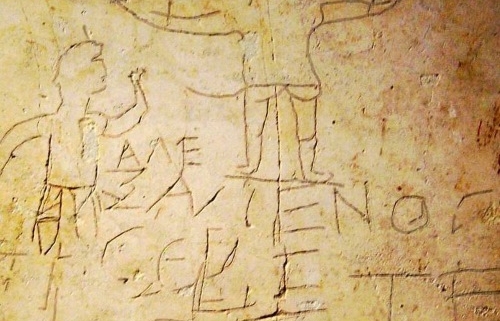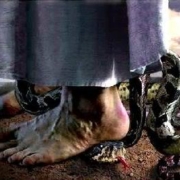Too Familiar With An Unfamiliar God
One of the earliest forms of Christian art isn’t a painting, sculpture or even a catacomb fresco. It’s a patch of graffiti on plaster, discovered in the Paedagogium on the Palatine Hill in Rome and dated to around 200 A.D.. Imperial teachers used the Paedagogium building to educate the emperor’s staff, and perhaps an idle student etched the crude artwork. The drawing depicts a man with an ass’s head, hanging on a cross. Viewed from behind, the crucified man turns to the left, looking down at a youth with a raised arm. An inscription underneath the cross figure claims in Greek, “Alexamenos worships his god” obviously mocking Jesus and those who followed Him.
From Jesus’ Garden experience, to His death on the cross, Jesus experienced a range of emotions, as friend, and foe did with Him as they wished. Feelings of apathy, complacency, betrayal, abandonment, injustice, scorn, contempt, and mockery – Jesus felt the full weight of them all. During His scourging He experienced the pain of their scorn, and mockery in a way very few humans have ever had the opportunity to endure. While writing this I think of an old saying, Familiarity breeds contempt. Yet there is also another saying that states, Humankind is way too familiar with an unfamiliar God. Both of these sayings ring true in the scourging, or flogging of Jesus.
The Almighty God, Creator of Heaven and Earth, the Most High God has been put on trial – by His crowning achievement, mankind. While men mocked, creation groaned, as the Savior of the world was beaten to ribbons. Soldiers who were present at the beating assumed they were dealing with just another despised Jew. But as they put Hm through the rigors of “preparation” for crucifixion they soon discovered that they weren’t at all familiar with this kind of man. Stripping Jesus naked, and stretching His arms above His head, they handcuffed Him to a pillar to begin what the Romans called the “half-death.” Called by this name because the punishment was so severe victims would often die during the scourging, or flogging. Two soldiers administered the punishment using a flagrum (a whip consisting of one leather cord that spread out into three to four thongs). Each thong made use of dumbbell-shaped bits of metal attached to the tails that at times contained bits of bone or pottery. Frederick Zugibe adds that: An analysis of the Shroud of Turin very strikingly reveals dumbbell-shaped markings all over the front and back of the trunk and legs down to the calves, essentially sparing the head, neck, and arms….He reminds us that the Jews had a limit of 40 lashes minus one, according to Jewish Law, but the Romans had no such limitations. In fact, the soldiers head lictor, had the responsibility of insuring the victim would not die during the process. His expertise, other than inflicting the ultimate pain, was to take the pulse of a victim who may have become unconscious during the process. If the pulse remained strong he gave the signal to continue lashing the accused until both soldiers became exhausted.
While most men screamed in agony, crying for mercy, Jesus took His punishment in silence. As Isa. 53 states: He was oppressed and He was afflicted, yet He opened not His mouth; He was led as a lamb to the slaughter, and as a sheep before its shearers is silent, so He opened not His mouth. These soldiers weren’t at all familiar with this kind of man. His majesty, and His silence, unsettled them. This led to His mockery by the other soldiers. What mankind doesn’t understand he often holds in contempt, and derision, lashing out at any opportunity to bring the scorned object down to a manageable level. Placing a half cloak of royalty upon His lacerated shoulders, platted thorns to form a crown to cover His scalp, they knelt in mock homage. As the soldiers filed past, they would kneel, spit on Him, snatching the mock reed scepter from His hand, striking His crown of thorns, nose and face. This created what is known in the medical community as trigeminal neuralgia, a neurological condition in which stabbing, lancinating, explosive, spasmodic pain lasted for hours. Patients who have agonized over this condition describe their pains as “knife-like stabs,” “electric shocks,” or “jabs with a red-hot poker.” The soldiers, exhausting the limits of their amusement, snatched the royal cape from His shoulders, which had become glued to His body by the clotted blood from the open wounds and lacerations. Following this shock, and searing pain, they placed His own robe back on His bruised, and bleeding body.
In a day, and age in which Christianity seems to be personified by “what’s in it for me?” In which, the average church member give accounts of their bouts of enduring the “rigors” of worship, prayer, or Bible study. When compared to the scourging of Christ it should become evident that were not that far removed from Roman soldiers who were indifferent to the sufferings of a King from another world; that we too have become way too familiar with an unfamiliar God. The Resurrection of Christ should lead us to truly kneel in homage to the King of all kings, surrendering, and committing our lives to become intimate with the One whose Heart was laid bare for all the world, and all of history to see. Have you been guilty of being too familiar with an unfamiliar God? Pledge your life to make this Resurrection Day one of renewed pursuit, and seeking, of the One Who gave His all in passionate love for you.







I was recommended this web site by my cousin. I am
not sure whether this post is written by him as nobody else know such detailed
about my trouble. You’re incredible! Thanks!